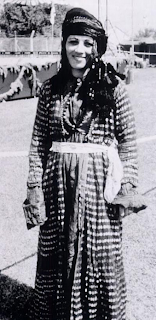
Former BBC journalist Rebecca Tinsley reports on her visit to Kurdistan in Jewish News. While the region slowly recovers from the ravages of ISIS, she finds that Iraq simply pays lip service to minority rights, and Christians and Yazidis are not receiving the international aid they need. (With thanks: Jonathan)
Jewish woman from Kurdistan photographed in Israel
What do these three news items have in common?
1) The beautiful synagogue in Akra in Iraqi Kurdistan is crumbling to the point of collapse, as Iraq’s famous Jewish families (Sassoon, Saatchi, Gubbay, etc.) are written out of Iraqi history.
2) Thirty six Iraqi Christian churches were destroyed by Islamic State in 2014, but thousands of Christians cannot return from internal exile. Their homes are now occupied by Muslim Arabs, and their former communities are controlled by opposing Arab and Kurdish militias who each claim territory in the plain of Nineveh.
3) August 3rd marks the fourth anniversary of Islamic State’s jihad against the Yezidi minority. Tens of thousands of men were killed, and 6,000 women and girls were enslaved, being bought and sold on WhatsApp, even by men who used to be their Iraqi neighbours. No one has collected forensic evidence from the 94 mass graves, and 3,200 of the women are still missing. No one has been prosecuted for what the international community recognises as genocide against the Yezidi.
What these stories share is the disconnect between the theoretical protection of minorities in the Iraqi constitution, and the reality, particularly in the aftermath of Islamic State’s conquest and retreat.
The Jews of Iraq predated the Christians, and the Yezidi predated even the Jews. Yet, the prevailing narrative is that Iraq’s history began when Islam arrived in the fertile region between the Tigris and the Euphrates. In practice, this means that ethnic and religious groups with deep and ancient roots, including the Jewish businesspeople who played a central role in the commercial development of Baghdad a century ago, are absent from history. It also means that minorities are increasingly treated as if they don’t belong.
In the nineteenth century, Akra, a town perched on a promontory in what is now Iraqi Kurdistan, had 19,000 Jewish residents. By 1930, following a wave of anti-Zionist feeling, there were only 1,000. The 1917 census recorded 80,000 Jews in Baghdad: is thought seven Jewish people remain now in the Iraqi capital.
With the rise of National Socialism in Germany, intolerance took hold in Iraq. Dohuk, Erbil, Ruwandiz, Barashi and Sukho, all ancient Jewish towns, saw thousands flee. In 1941, Nazi-inspired riots left 200 Jews dead. In 1945, the Kurdish Jews were expelled from Erbil. Finally, the founding of the state of Israel led to a wholesale exit from Iraq, as the Jewish population was made to feel unwelcome.
After two days on the road, during which I searched for remaining synagogues, my Kurdish driver admitted his mother and grandmother had been Jewish. However, like many families who stayed, they told people they had converted to Islam in a bid to fit in. The driver was proud of his Jewish roots, but he also knew to hide them for the sake of an easy life.
Now, the Kurdish Regional Government boasts it is The Other Iraq (meaning modern and tolerant). It is true that there is a greater acceptance of minorities, and the Iraqi Kurds gave refuge to hundreds of thousands of Yezidi and Christians when IS drove them from their homes. A 2015 law guarantees parliamentary seats to Christians, Turkmen and women. However, there is little political will in the Kurdish Regional Government to prosecute IS members for the deliberate targeting of the Yezidi, or the use of rape as a weapons of war (a precedent established in Bosnia), despite a wealth of survivor testimony which includes the names of IS perpetrators.
In the 1950s, an Iraqi rabbi reputedly warned a Christian cleric, “Sunday follows Saturday,” meaning that having forced out the Jewish population, the Christians were next. There have been Christians in Iraq since the first century – the world’s longest continual Christian presence. However, their numbers have recently collapsed from 1.5 million to fewer than 250,000.
Nuns in Qaraqosh on the plain of Nineveh told me how, in 2014, as IS rampaged across Iraq, the authorities assured the Christian communities they would be safe. Yet the Kurdish peshmerga militia withdrew suddenly without telling the Christians, leaving thousands of people scrambling to escape a mere 30 minutes before IS arrived.
The Iraqi government claims it respects the rights of minorities, and it is a signatory of sundry international conventions protecting the rights of different ethnic and religious groups. However, I was told that much of the humanitarian aid appears to have been directed at Muslim areas, even though the Christians and Yezidi suffered disproportionately.

Leave a Reply